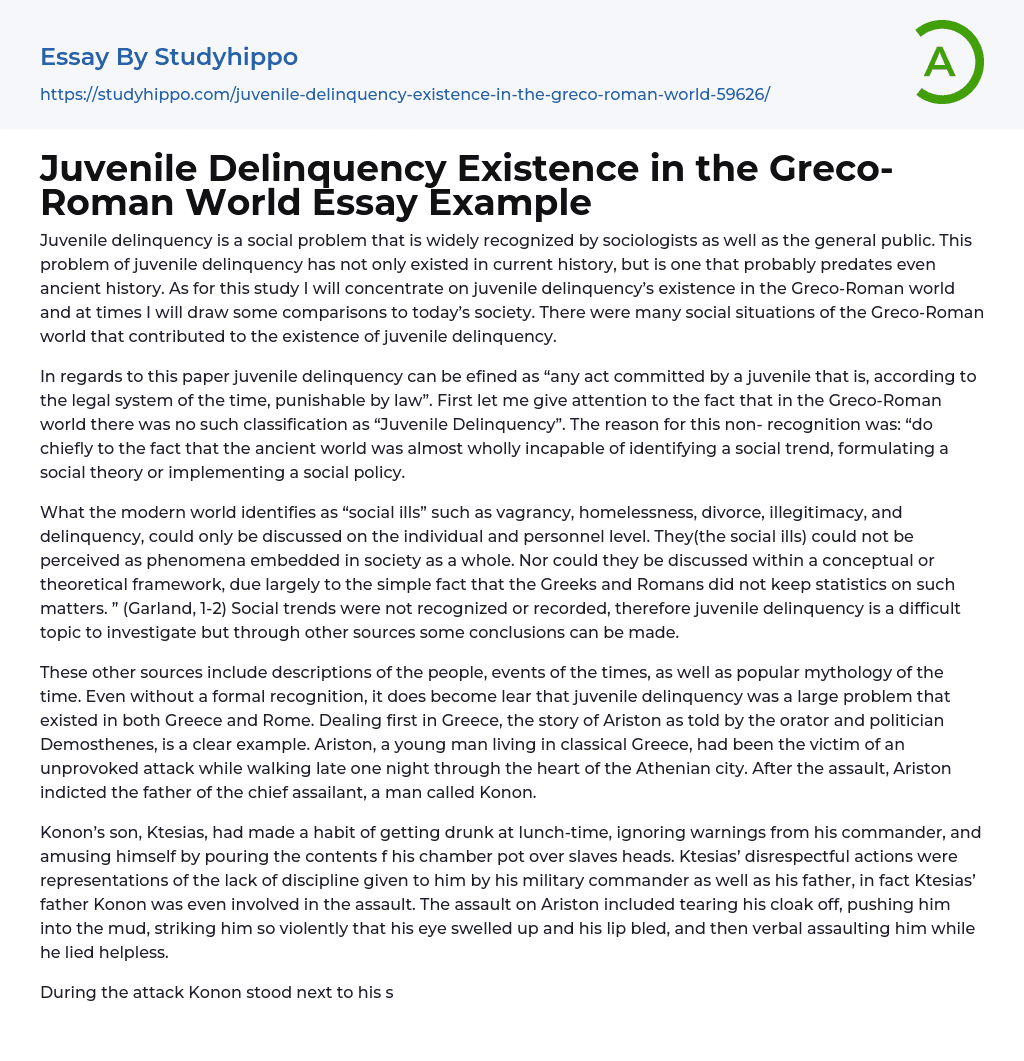

Juvenile Delinquency Existence in the Greco-Roman World Essay Example
Examining juvenile delinquency in ancient times, particularly in the Greco-Roman world, is crucial due to its long-standing recognition as a significant social problem. This study aims to shed light on this issue during that period and occasionally draw comparisons with contemporary society. Various social factors had an impact on the prevalence of juvenile delinquency in the Greco-Roman world.
Juvenile delinquency, which refers to any act committed by a young individual that can be legally punishable, was not recognized in the ancient Greco-Roman world. The absence of this concept can be attributed to the limited capacity of ancient societies to recognize and examine social patterns, develop social theories, or enforce social interventions.
In today's world, certain societal problems like vagrancy, homelessness, divorce, illegitimacy, and delinquency are considered "social ills." Previously, these issues were only addressed individually and were n
...ot seen as interconnected within society. Additionally, the Greeks and Romans' failure to keep statistical records is responsible for the absence of conceptual or theoretical frameworks to analyze these matters (Garland, 1-2). As a result, studying juvenile delinquency becomes challenging due to the lack of recognition and documentation of social patterns. Nevertheless, alternative sources can still provide valuable insights.
These other sources describe the people, events of the times, and popular mythology of ancient Greece and Rome. Juvenile delinquency was a significant problem in both societies; however, it was not officially recognized. In Greece, Demosthenes, an orator and politician, narrates the story of Ariston to illustrate this issue. Ariston, a young man residing in classical Greece, was brutally assaulted one night while strolling through the center of Athens without any provocation. After the incident, Ariston accused Konon, who happened to b
the father of the main attacker.
The disrespectful actions of Ktesias, who is Konon's son, were a result of the lack of discipline he received from his military commander and his father. Despite warnings, Ktesias would get drunk at lunchtime and find amusement in pouring his chamber pot's contents over the heads of slaves. Not only was Ktesias' father, Konon, involved in the assault on Ariston, but the assault itself included tearing off Ariston's cloak, pushing him into the mud, violently striking him causing his eye to swell and his lip to bleed, and verbally attacking him while he was defenseless.
During the attack, Konon stood by his son, encouraging him by imitating the victorious sounds of fighting cocks. Fortunately, Ariston was rescued by passersby. There are clear parallels to the present times. Firstly, like many incidents in today's society, the attack was fueled by alcohol. Konon and his son had attended a drinking party beforehand. Secondly, Athenian military service, with its lack of discipline, often led to senseless acts of violence instead of providing a safe outlet for young individuals. This argument is currently discussed in the explanation of delinquency.
Ariston cautioned the jury that during his speech, Konon might defend his son by resorting to the cliche justification of "boys will be boys". Ariston believed that Konon would attempt to argue that Ktesias' actions were no different from those of other youth in Athens who come from decent backgrounds and get caught up with prostitutes, leading to conflicts. Konon would likely compare his son's behavior to that of other young people to normalize it. However, Ariston emphasized that the attack had nothing to do with prostitutes
but rather stemmed from the assailant holding a grudge against him for reporting incidents to their commander.
Regardless of the outcome and the level of Ariston's involvement in provoking the attack, that is not the main focus. The main point is that this incident was not an isolated occurrence and supports the defendants' portrayal of young Athenian males as accurate. In Greece, young manhood was commonly characterized by aggression, intoxication, and promiscuity. Their competitiveness likely played a significant role in a society that highly valued competition in all aspects of social life. Greek mythology also presents another perspective on juvenile delinquency in the Greco-Roman world.
- Abortion essays
- Abuse essays
- Animal Rights essays
- Animal Testing essays
- Assault essays
- Bullying essays
- Controversial Issue essays
- Crash essays
- Cyber Bullying essays
- Feminism essays
- Human Rights essays
- Immigration essays
- Inequality essays
- Poverty essays
- Prejudice essays
- Racism essays
- Torture essays
- Violence essays
- Acceptance essays
- Age Of Enlightenment essays
- Child Observation essays
- Confucianism essays
- Conscience essays
- Critical Reflection essays
- Destiny essays
- Determinism essays
- Empiricism essays
- Environmentalism essays
- Epistemology essays
- Ethics essays
- Ethos essays
- Existence essays
- Existentialism essays
- Fate essays
- Free Will essays
- Functionalism essays
- Future essays
- Good And Evil essays
- Human Nature essays
- Individualism essays
- Meaning Of Life essays
- Metaphysics essays
- Natural Law essays
- Personal Philosophy essays
- Philosophers essays
- Philosophy Of Life essays
- Political Philosophy essays
- Pragmatism essays
- Reality essays
- Relativism essays



